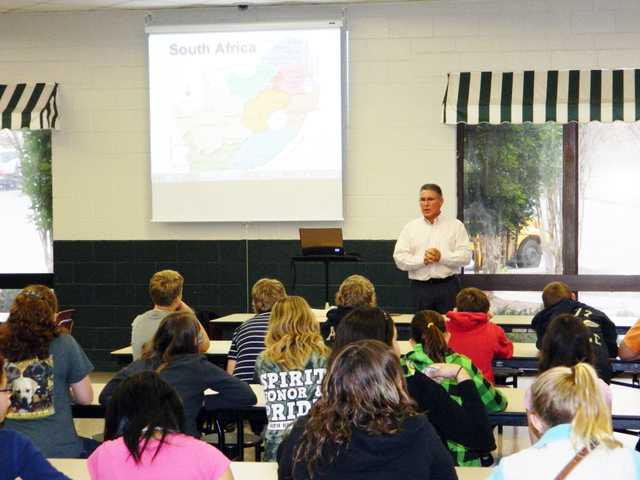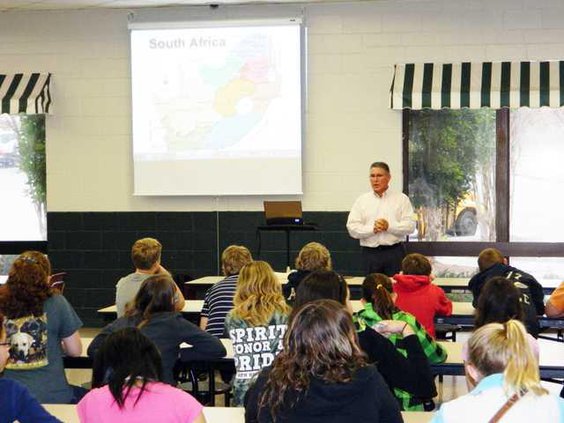As a child, nothing about his neighborhood in South Africa surprised the Rev. Johan Joubert. For the most part everyone looked the way he did and spoke the same language as his family. It wasn’t until he became an adult that he realized things weren’t as balanced as they appeared. "When I left school in 1974, I became an officer with the South African police," said Joubert during his recent visit at North Hall Middle School. "We had to enforce the law. After 9 o’clock at night, no black individual was allowed in the streets of any white community. If you found someone in the street after 9, you arrest them and put them in jail. "Do y’all think that’s fair? It feels a little unfair, doesn’t it? But when you grow up like that, it feels like that’s the way it is so you do not question it." Joubert, who relocated to Gainesville from South Africa with his family 11 years ago, was at the middle school to speak to seventh-graders in Buddy Fisch’s social studies class. The students have studied the former African segregationist system of government known as apartheid, and Joubert was there to share his firsthand account. Although the different races in South Africa always had tense interactions, Joubert says relations took a volatile turn in the late 1940s. "In 1948, things changed dramatically for the worst. The National Party surprisingly came to power and they enforced segregation," Joubert said. "Apartheid became the official government ideology that I grew up in. Whites couldn’t live among blacks. Blacks couldn’t live among (mixed race) people and (mixed race) people couldn’t live among whites. "Everybody was kept apart — schools, neighborhoods, everything." Despite being the majority of the population, black Africans were subjected to the unfair whims of a minority government. They weren’t allowed to use most public facilities and had to endure other injustices. "Every South African carries an identification document. It’s almost like a passport," Joubert said. "White South Africans were never required to carry it to identify themselves wherever they went, but when you are a person of color, it was against the law to go anywhere without your identification called a pass book." Freedom fighters like Nelson Mandela launched a defiance campaign in the 1950s and fought against the apartheid system. Mandela even burned his pass book. The protests garnered international attention in the 1970s with the student riots in Soweto. "In 1976, I was just a young police officer, just 19 years old. I was at the office working and the superiors called us in and said get your coat, get your gun, get the ammunition and meet at the police station in Johannesburg," Joubert told the students. "One of the captains came and addressed us and said there were riots and trouble in the city of Soweto. I remember him saying, ‘If you are not prepared to stand for the fight and you are scared of it, I will respect your choice if you walk out now.’ A few guys walked out, out of a room of hundreds. "He also said, ‘Once we are in the conflict, if you turn your back, I’ll personally shoot you.’ That was a little scary for a 19-year-old getting into that kind of conflict way before you are ready for it." Joubert didn’t know it at the time, but the Soweto students were protesting the government requiring students to abandon their native languages and learn Afrikaans instead. "The students resisted and organized peaceful rallies. The police came because wherever there’s a crowd, things may get out of hand. Eventually, it burst into violence," Joubert said. "The young people were running with trash can lids and sticks. They threw stones. If you didn’t know the challenges they were going through, you were ignorant. I was ignorant of what it was all about. "They started marching to one of the stadiums and it got out of hand. Shots were fired and people were killed. The riot left close to 600 people dead. That called for a state of emergency. The international community was coming against this unfair practice of apartheid." Conflicts between the apartheid-based government and the anti-apartheid protestors continued for many years until 1990 when reforms were made by then President F.W. de Klerk, which freed Mandela, after he had been jailed for nearly three decades. In 1994, Mandela was sworn in as the first post-apartheid president. "During the transition time, many people thought it was the end of the world. The majority of South Africa was black and the minority was white. All of the sudden the majority was going to take control and a lot of white folks feared the change," Joubert said. "I didn’t think it was going to be the end of the world. I could see a new South Africa coming." Even though apartheid was over before the middle school-aged members of Joubert’s audience were born, he says there are still relevant lessons to be learned from that bit of history. "I think we can never forget the injustices of the past," Joubert said. "We need to learn from them in order to envision a better future of fairness and equality for everybody. I hope in a small way South Africa can be a role model for that."
North Hall students hear apartheid accounts from former South African police officer

